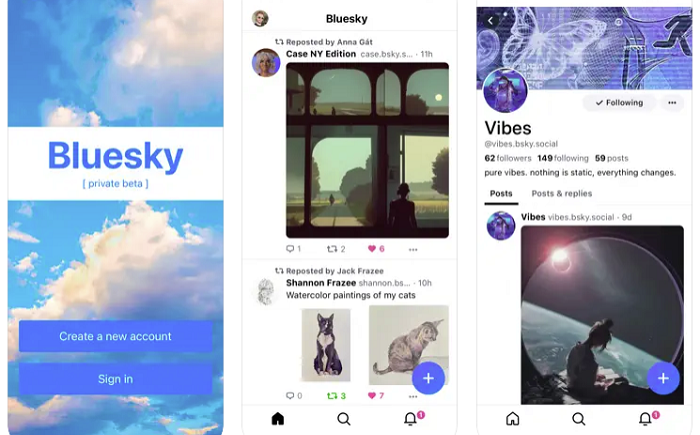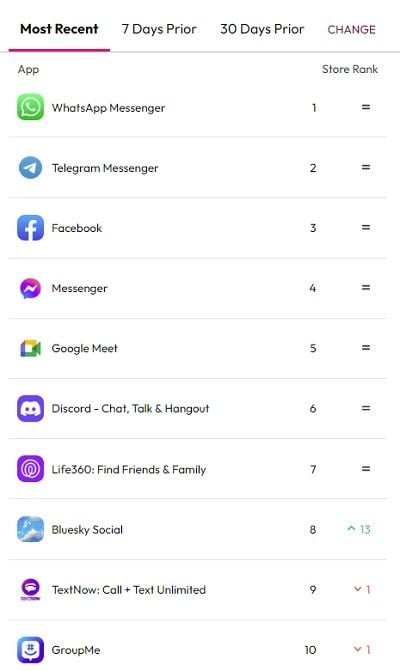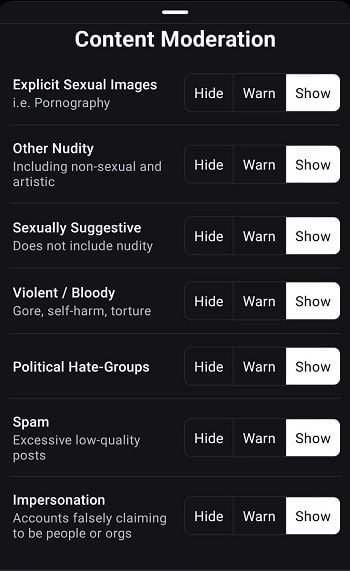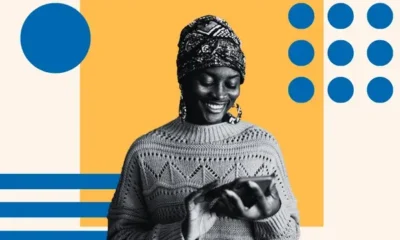SOCIAL
Could Bluesky Supersede Twitter as the Key Real-Time Social App?

While Elon Musk’s changes at Twitter have been heavily criticized by many, according to Twitter’s numbers, usage of the platform has not declined as a result.
Indeed, while Twitter has reinstated a range of previously banned users, including neo-Nazis, misinformation peddlers, transphobic spokespeople, and worse, while Twitter’s softened its rules around content removals, potentially putting more people at risk of abuse, while its changes to verification have opened the app up for more manipulative behavior, and it’s switched up tweet ranking, so that paying users get priority. Despite all of this, Twitter claims that usage is actually reaching new record highs.
Why is that? Well, in part, there’s a fascination with controversy, and it could be that more people are interested in seeing how these changes play out. But the main factor is that there’s nowhere else that offers the same experience – there’s nothing like Twitter that offers a real-time stream of updates from some of the most influential people on the planet, as well as top-level journalists breaking news, along with the people and profiles that you’ve been following for years, who are still sharing key updates via the app.
But the tide could be changing – and ironically, it’s because of the man who once labeled Elon ‘the singular solution’ to getting Twitter back on track.
While he was still in charge at Twitter, Jack Dorsey launched a new social platform project called ‘Bluesky’ which is focused, essentially, on creating a better version of Twitter, free from the various impediments that Dorsey believed had stymied his vision for his original app over time.
Built around decentralization, the main aims for Bluesky, according to Dorsey, are:
- To facilitate enhanced efforts to address abuse and misleading information, without overburdening staff
- To enable users and the broader community to have more input into platform algorithms
- To improve conversational health by giving people more input into platform rules
Based on the way that other decentralized social projects have gone, Bluesky has seemed like a similar pipe dream, a utopian vision for how a social platform can coalesce, like a natural organism, and rely on the power of the collective – while in reality being utterly unusable for regular people who don’t have a background in computer science.
Yet despite this, Bluesky is actually, seemingly working, for regular people as well as more tech-aligned types. And it’s now attracting some big-name users, a key step in facilitating mass adoption.
As reported by Decrypt:
“Among the big names joining the platform are Rep. Alexandria Ocasio-Cortez (D-NY), who has over 13 million followers on rival platform Twitter, and ‘Guardians of the Galaxy’ director James Gunn, who’s recently taken charge of DC Comics’ film output. Others who’ve joined the invite-only platform include model Chrissy Teigen, ‘Mission: Impossible’ director Christopher McQuarrie, ‘Silicon Valley’ and ‘The Eternals’ star Kumail Nanjiani, Edgar Wright, director of ‘Shaun of the Dead’ and ‘Scott Pilgrim Vs. The World’, and ‘Moon’ director Duncan Jones.”
The migration of influential users is significant, and what’s led to big changes in the social media landscape in the past. Vine, for example, was shut down not because Twitter failed to manage the platform properly (as per the now pervading narrative), but because its top creators demanded more money from Twitter to keep sharing their content in the app. When Twitter refused, they switched to YouTube and Instagram instead, which was the beginning of the end for Vne, as their legions of fans gradually stopped paying attention to the app as a result.
Could the same now be happening to Twitter – and could Twitter be killed off by its own decentralized project, which the company itself invested millions in?
When the Bluesky project was first launched in 2021, Twitter invested $13 million into what would eventually become an independent entity. Dorsey has continued to fund Bluesky since October, when it effectively separated from Twitter – i.e. Musk and Co. cut off Twitter’s funding, while as part of the Musk takeover, Dorsey also rolled over his shares of Twitter into Bluesky, giving it more runway to keep building. But in essence, right now, Bluesky is separate from Twitter – though given Musk’s angst around OpenAI, another project that he funded in its early stages, that’s now making money without him, I suspect that Elon will be none too pleased if Bluesky does emerge as a legitimate threat.
Which is still, to be clear, a long way off. Bluesky’s currently operating on an invite-only basis at this stage, which significantly restricts its capacity to see mass adoption and take-up.
But it is growing, fast. According to data.ai, Bluesky Social is currently the 8th most-downloaded social media app.

The hype around Bluesky seems to already have superseded Mastodon, the other big Twitter alternative, and with a UI that’s virtually the same as Twitter (minus DMs and some other functional elements), it does seem like Bluesky, at least right now, is offering some communities a better experience than the changed Twitter feed.
Bluesky also offers a range of content control options which could lessen the impact of an expanded user base, as a broader range of people set up profiles in the app.

To be clear, Bluesky still has a lot of challenges to overcome, and those challenges compound with every thousand or so more active users. It’s not going to be a simple scaling – hence the steady, invite-only process. But there are signs that Bluesky could be legit, and could be the real Twitter alternative that people have been seeking.
It’ll be interesting to see how Musk responds – as noted, he has a growing track record of attacking anything that he deems a threat, with more specific venom for projects that he’s had prior association with.
I suspect, as the hype grows, Musk will look to punish links to Bluesky, or ban references to it – though at that stage, it could be too late, especially if big-name users continue to switch across, and start posting exclusively on Bluesky instead.
That’s a more significant next step, as most users still seem to be posting on both Twitter and Bluesky concurrently.
But there are some signs that this could be the thing, which could be a big problem as Musk continues to alienate elements of Twitter’s user base.
SOCIAL
Snapchat Explores New Messaging Retention Feature: A Game-Changer or Risky Move?

In a recent announcement, Snapchat revealed a groundbreaking update that challenges its traditional design ethos. The platform is experimenting with an option that allows users to defy the 24-hour auto-delete rule, a feature synonymous with Snapchat’s ephemeral messaging model.
The proposed change aims to introduce a “Never delete” option in messaging retention settings, aligning Snapchat more closely with conventional messaging apps. While this move may blur Snapchat’s distinctive selling point, Snap appears convinced of its necessity.
According to Snap, the decision stems from user feedback and a commitment to innovation based on user needs. The company aims to provide greater flexibility and control over conversations, catering to the preferences of its community.
Currently undergoing trials in select markets, the new feature empowers users to adjust retention settings on a conversation-by-conversation basis. Flexibility remains paramount, with participants able to modify settings within chats and receive in-chat notifications to ensure transparency.
Snapchat underscores that the default auto-delete feature will persist, reinforcing its design philosophy centered on ephemerality. However, with the app gaining traction as a primary messaging platform, the option offers users a means to preserve longer chat histories.
The update marks a pivotal moment for Snapchat, renowned for its disappearing message premise, especially popular among younger demographics. Retaining this focus has been pivotal to Snapchat’s identity, but the shift suggests a broader strategy aimed at diversifying its user base.
This strategy may appeal particularly to older demographics, potentially extending Snapchat’s relevance as users age. By emulating features of conventional messaging platforms, Snapchat seeks to enhance its appeal and broaden its reach.
Yet, the introduction of message retention poses questions about Snapchat’s uniqueness. While addressing user demands, the risk of diluting Snapchat’s distinctiveness looms large.
As Snapchat ventures into uncharted territory, the outcome of this experiment remains uncertain. Will message retention propel Snapchat to new heights, or will it compromise the platform’s uniqueness?
Only time will tell.
SOCIAL
Catering to specific audience boosts your business, says accountant turned coach

While it is tempting to try to appeal to a broad audience, the founder of alcohol-free coaching service Just the Tonic, Sandra Parker, believes the best thing you can do for your business is focus on your niche. Here’s how she did just that.
When running a business, reaching out to as many clients as possible can be tempting. But it also risks making your marketing “too generic,” warns Sandra Parker, the founder of Just The Tonic Coaching.
“From the very start of my business, I knew exactly who I could help and who I couldn’t,” Parker told My Biggest Lessons.
Parker struggled with alcohol dependence as a young professional. Today, her business targets high-achieving individuals who face challenges similar to those she had early in her career.
“I understand their frustrations, I understand their fears, and I understand their coping mechanisms and the stories they’re telling themselves,” Parker said. “Because of that, I’m able to market very effectively, to speak in a language that they understand, and am able to reach them.”Â
“I believe that it’s really important that you know exactly who your customer or your client is, and you target them, and you resist the temptation to make your marketing too generic to try and reach everyone,” she explained.
“If you speak specifically to your target clients, you will reach them, and I believe that’s the way that you’re going to be more successful.
Watch the video for more of Sandra Parker’s biggest lessons.
SOCIAL
Instagram Tests Live-Stream Games to Enhance Engagement

Instagram’s testing out some new options to help spice up your live-streams in the app, with some live broadcasters now able to select a game that they can play with viewers in-stream.
As you can see in these example screens, posted by Ahmed Ghanem, some creators now have the option to play either “This or That”, a question and answer prompt that you can share with your viewers, or “Trivia”, to generate more engagement within your IG live-streams.
That could be a simple way to spark more conversation and interaction, which could then lead into further engagement opportunities from your live audience.
Meta’s been exploring more ways to make live-streaming a bigger consideration for IG creators, with a view to live-streams potentially catching on with more users.
That includes the gradual expansion of its “Stars” live-stream donation program, giving more creators in more regions a means to accept donations from live-stream viewers, while back in December, Instagram also added some new options to make it easier to go live using third-party tools via desktop PCs.
Live streaming has been a major shift in China, where shopping live-streams, in particular, have led to massive opportunities for streaming platforms. They haven’t caught on in the same way in Western regions, but as TikTok and YouTube look to push live-stream adoption, there is still a chance that they will become a much bigger element in future.
Which is why IG is also trying to stay in touch, and add more ways for its creators to engage via streams. Live-stream games is another element within this, which could make this a better community-building, and potentially sales-driving option.
We’ve asked Instagram for more information on this test, and we’ll update this post if/when we hear back.
-

 PPC5 days ago
PPC5 days agoHow the TikTok Algorithm Works in 2024 (+9 Ways to Go Viral)
-

 MARKETING6 days ago
MARKETING6 days agoA Recap of Everything Marketers & Advertisers Need to Know
-

 SEO4 days ago
SEO4 days agoHow to Use Keywords for SEO: The Complete Beginner’s Guide
-

 SEO6 days ago
SEO6 days agoBlog Post Checklist: Check All Prior to Hitting “Publish”
-

 MARKETING5 days ago
MARKETING5 days agoHow To Protect Your People and Brand
-

 SEARCHENGINES6 days ago
SEARCHENGINES6 days agoGoogle Started Enforcing The Site Reputation Abuse Policy
-

 PPC6 days ago
PPC6 days agoHow to Craft Compelling Google Ads for eCommerce
-

 MARKETING6 days ago
MARKETING6 days agoElevating Women in SEO for a More Inclusive Industry














